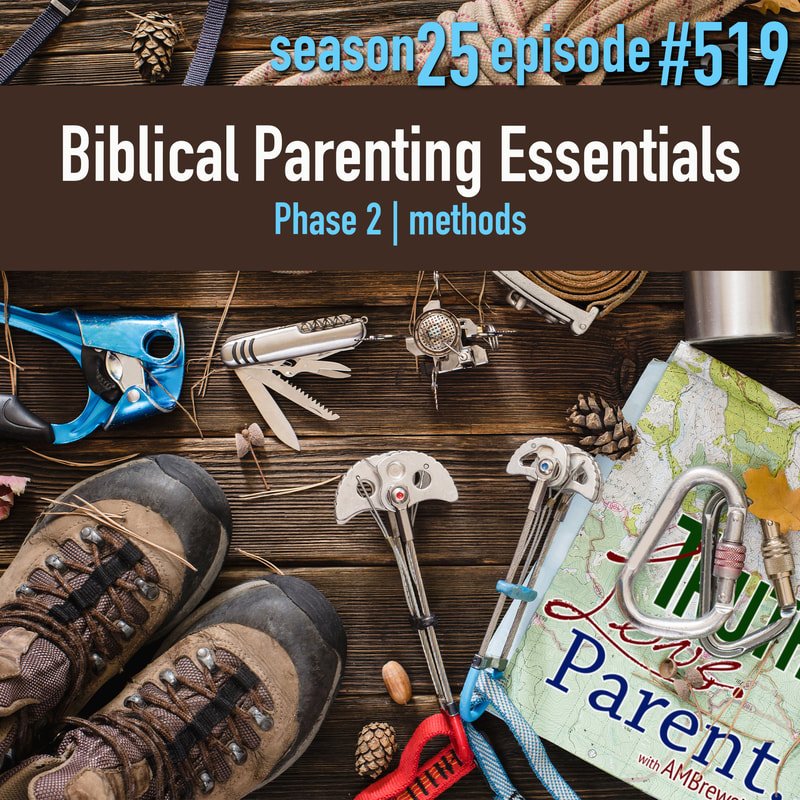[ad_1]
Click the link below to download the PDF.
So far we’ve laid out the two main parts of parenting, and then we talked about the methods and content of the First Phase of Biblical Parenting (which is part one of part two of parenting—just because . . . you know . . . apparently I like to make things difficult). And today we’re going to introduce the Second Phase of Biblical Parenting as well as discuss helpful methods.
If you’re a long time listener, I pray that today’s show will be a good review, but also equip you in new ways with new information. And if you’re new to the show, I welcome you and ask that you make sure to start with the first episode in this series. Of course, if you’ve already done that, today’s show will not only teach you about Phase 2 of God’s will for your parenting, but it will also provide you a ton of resources to continue your personal discipleship.
And—speaking of personal discipleship—I recently returned form Vermont where I was invited to speak to the families of Grace Christian School, conduct a parenting Q&A, and challenge the members at Mount Greylock Baptist Church in North Adams, Massachusetts. Previously, I’ve also had the pleasure of speaking virtually to the students of Grace Christian School.
Now, I mention this because you too can invite me to speak for your church, school, camp, mom’s group, conference, or whatever event you may have. It can be in-person or virtual, and we can discuss whatever topics you and your community need most.
All you have to do is visit TruthLoveParent.com and click on the conferences tab. Or you can go to AMBrewster.com. Both will provide you all the information you need to book me for your next event.
And while you’re at TruthLoveParent.com, I want to ask you to click on the donate tab. We are a listener-supported ministry, and we desperately need your help to meet our financial needs from year to year. You may only be able to give $5 a month, but please don’t not give because you think your gift is too small. There’s no such thing. We are honored to receive and to steward gifts of every size.
Just visit TruthLoveParent.com to invite me to speak to you group, donate to the ministry, and access the free episode notes, transcript, and related resources for this series
I greatly appreciate you and all the ways you interact with this ministry. May God be glorified as we help you worship Him better in your parenting.
So, today we’re going to introduce the Phase as well as discuss valuable methods for this Phase. Next time we desire to talk about how to reinforce Phase 2, and then we want to study a way to evaluate how we’re doing on Phase 2.
So, let’s start today be rereading II Timothy 3:16, “All Scripture is inspired by God and profitable for teaching, for reproof, for correction, for training in righteousness; 17 so that the man of God may be adequate, equipped for every good work.”
If teaching is Phase 1, then you have likely deduced that Reproof is Phase 2. And you are right if you made that deduction.
So . . .
1. What is Reproving?
According to Merriam-Webster, reproof is “criticism for a fault,” and to reprove is “to scold or correct usually gently or with kindly intent.”
To be honest, those definitions aren’t as helpful as they may sound. In fact, the second could be confusing given the fact that Phase 3 of Biblical Parenting is actually called “correcting.”
What makes this process even more challenging is that the Greek word translated “reproof” in II Timothy 3:16 is a hapax legomena—which means that this is the only place in the Bible where this particular Greek word is used. Thankfully, it’s grammatically related to another word that is used far more often, and the first time we encounter that word is in Matthew 18.
Matthew 18:15-17 is often referred to as the Church Discipline passage, however, it would be better understood to refer to a discipleship passage. In these three verses Jesus sets out a very simple and extremely valuable way to deal with conflict resolution in the church. And in verse 15 He says, “If your brother sins, go and show him his fault in private; if he listens to you, you have won your brother.”
The phrase translated “show him his fault” is the Greek word we want to better understand today. And that translation really does a great job. This word has to do with convicting, confuting, refuting, and rebuking, and carries with it the idea of not only telling someone they are wrong, but doing so in a persuasive manner so that they desire to change.
And that’s how I want to define “reprove” today. The Second Phase of Biblical Parenting is reproving, and reproving your child means that you persuasively show them that they are wrong.
Teaching tells a child what God says is wrong and what God says is right. Lord willing, they will learn from the teaching, pursue the right, and shun the wrong. But since they are sinners and begin their lives unsaved, we can be assured that they will sin, and when they do, we will need to help them see that they did wrong.
So, that’s what it means to reprove, and—let’s be honest—you probably do that all the time. Even those parents who don’t like to use the words “no” or “wrong” or “sin” still communicate to their children that there really are better ways to do something.
By the way, Christian parents definitely need to use the words “no,” “wrong,” and “sin” because they are biblical words. We just need to make sure we use them in Christ-honoring ways.
Also, it’s important to note that each Phase of Biblical Parenting is part of the subsequent Phases. Pure teaching occurs when a child hasn’t sinned. But teaching is definitely part of reproof because our kids will likely have to learn new things in order to be persuaded of their sin. If you hear me distinguish between Pure Teaching and Reproof Teaching, then you’ll know what I mean.
Now, before we talk about various methods for reproving our children, I want to share some resources with you so that you can continue your study.
The first is an episode called Your Kids Need an Interpreter. I like to refer to the reproof phase of parenting as the Interpretation Phase of parenting. Your children did not interpret the situation well, they thought the wrong choice was the right choice, and the most loving thing we can do for them is to reinterpret the situation as God would have them understand it.
The Your Kids Need an Interpreter and A Parent’s 5 Jobs, Part 3 | Interpreter will flesh this stage out in more detail and set you up to do it well.
In addition, we have an episode called How Do You Become an Interpreting Parent? That episode will put you on the right path to doing Phase 2 to God’s honor and glory. Listen, we all need to change. You need to reprove your kids better than you currently do; so do I. So, this episode will provide valuable ways for us to continue growing.
And the last introductory resource I have for you today is called The Most Beautiful Part of Parenting. Whether we like to admit it or not, every parent secretly desires stress-free parenting. We want our kids to be good because that will be better for them, better for the home, and better for us. And we try to avoid the disobedience, conflict, reproof, and pain. But when we see our parenting the way God sees it, it’s the difficult times, the reproving, the rebuking, the admonishing, that often are the most beautiful moments in our parenting.
The episode The Most Beautiful Part of Parenting will hopefully help you appreciate Biblical Parenting Phase 2 that much more.
Alright, with that foundation laid, let’s consider a few . . .
2. Christ-honoring methods for reproving your children
Now, if you’ve listened to this show for any length of time, then you should recognize that I added a new concept to this idea that I’ve never verbalized well before. It’s the idea of persuasively showing your kids that they’re wrong.
And though we all try to do that—I mean, the vast majority of us don’t just tell our kids they were wrong and then let them continue on doing wrong—the whole purpose of telling them they’re wrong is so that they will change. Therefore, we all try to be very persuasive.
Unfortunately, most of the time that leads to voluminous amounts of pragmatism. For example, “If you don’t stop taking cookies without permission, you’re going to start taking other things without permission, and though it may not seem like a big deal at first, that cookie will turn into money from your sister’s piggy-bank, and that will turn into a trinket from your friend’s house, and the next thing you know, you’ll be in jail because you tried to steal someone’s car.”
Now, that line of thinking was actually accurate. Stereotypically, things do progress just like that if a child doesn’t stop stealing. I know, because I was that child. Praise God I never tried to steal a car, but that’s beside the point.
The point is that such reasoning (persuasive though it may be) is pragmatic, and pragmatic motivation is not only super-dangerous, it’s wickedly sinful.
If my child’s motivation for their behavior is to avoid consequences or avoid becoming a version of themselves they don’t like, their motivation is self-centered. It’s all about what they want and don’t want.
I do believe illustrations like the one I just gave do have value when they are couched in biblical truth. They do well to illustrate that what God says about sin, callousing ourselves, and consequences are all true. But they mustn’t be handed to our kids as the main motivation.
Therefore, the first method we’re going to discuss today (and which will form the basis for all the others is) . . .
A. Use the Scriptures to convince your children they’re wrong.
This should be a no-brainer. We’re taking about being an Ambassador Parent who represents God to our kids, and the Scriptures are not only God’s communication to us, but It’s also the main tool God designed to mature and perfect us.
And yet I’m amazed how many parents don’t use it.
On the other hand, I need to warn you. Just because you use the Bible in your parenting, doesn’t mean you’re using it the right way. Too many parents like to use the Bible pragmatically. They turn to a passage about how stealing is a sin, and they use that as the jump off point for warning their kids about the consequences for stealing.
And—again—that’s all accurate. Your kids need to understand sin and consequences. But why is sin what it is? Why do consequences exist?
You need to ground discussions like this in the reality that God is Who He says He is. When we steal, we’re attacking God’s character. We’re attacking His sovereignty, His provision and care, His love, His mercy and grace, we’re attacking His expectations for our obedience, and the list goes on.
Stealing shouldn’t be avoided because of the trouble we may invite into our lives. No, stealing should be avoided because God is awesome. He deserves better from us and He expects better from us and He empowers us to do better.
This is the very approach the Holy Spirit inspired the human authors to take. God told Moses that all of the commandments started with having only one God. Jesus said the same thing when asked about the greatest commandment. We need to love God with every fiber of our being. The Old Testament Prophets linked obedience to God’s character and deeds long before they brought up God’s promises. And the New Testament writers often started their letters with doctrinal truth before explaining how that truth should affect our behavior. And, guess what, this is far more persuasive than any pragmatic observations we can make.
Now, I’m not saying that your kids will be persuaded when you reprove them well. Each is responsible to submit to God’s truth, but we know that God’s Word always accomplishes its purposes in a person’s heart. Therefore, using the Scriptures is guaranteed to affect them in one way or another—all according to the will of God.
So, what about you? If you use pragmatism in your parenting, you’re actually revealing to your kids and everyone who watches you that you too have a worship problem. You’re leaning on your own understanding to manipulate your kids into submission. You’re not giving God the preeminence and priority that He deserves.
We parents need to start by recognizing that our own parenting needs to be motivated biblically. We mustn’t parent our kids in order to ultimately accomplish something in their lives. We must parent the way we do because we love God and want to worship Him with our lives. And then we trust God to do the rest.
Do you use the Scriptures to persuade your children of their sin, and do you motivate their behavior in Christ?
I recommend you listen to our Speed Parenting Series. In that series we talk about the huge temptation to use pragmatism and how we need to fight that proclivity.
And then we have two one-off episodes that are really very helpful once we have the right motivation for our parenting. The first is called How to Rightly Debate Your Child, and the second is Sun Tzu’s 5 Dangerous Faults of a General.
In and of themselves, they may sound a little pragmatic at times, but they’re built off the foundation of the fact that our parenting must submit to God. These episodes simply build on the historical and practical realities of conversing with people who disagree with you. I think you’ll enjoy the episodes and benefit greatly from them. And the links to all of these episodes will be in the description of today’s.
Okay, so the next method is different from the first, but it also requires the same truths we just discussed.
B. Use questions to guide your children to a biblical understanding that they’re wrong.
In the first step we’re using the Scriptures to tell our kids they’re wrong. In the second, we’re using the Scriptures and an arsenal of questions to guide our kids to understand that they’re wrong.
This should sound familiar because this is the difference between Deductive Teaching and Inductive Teaching. We could just as easily refer to Deductive Reproof and Inductive Reproof, and the guidelines for how we choose which one in any given situation are the same for reproof as they are for teaching. You can listen to the end of the episode 517 to revisit those guidelines.
I will say, though, that situations involving reproof have a new layer of difficulty. Pure teaching is done in a relational context where the child and the parent are not at odds. No sin is being addressed. However, if we’re reproving, we’re doing so because the child has sinned, and that has a very different relational impact.
Now, I’m not saying that Inductive Reproof doesn’t work, I’m just saying that we may find that Deduction is a far better approach at first.
Of course, there are great times to use questions to draw our children inductively to a truth. In the Speed Parenting Series I talk about this very point and will teach you about the Three Questions approach.
Now, the Speed Parenting Series is all about parenting when you don’t have a lot of time. But that isn’t always the case, so I want to introduce you to an episode called “Why ‘Why’ Is More Important Than “What” | asking the right questions to reveal the wrong heart.”
And there’s also The Second Most Important Question You Need to Ask Your Kids. On the topic of questions, you might as well know which two are the most important.
Now, regardless of which of the previous methods you use (using the Scripture to tell or using the Scripture to ask), there’s another desperately important method that most parents I’ve met don’t use.
C. Invite your children to accept or reject the biblical interpretation of the events.
Your child was presented with a temptation, and James 1 tells us that they were carried away and enticed by their own lust, and the lust conceived and gave birth to sin.
They believed the lie that their fleshly lust was the best thing for them. So they sinned by either not doing what they should have done and/or doing what they should’t have done. And now—as the Ambassador Parent—it’s your responsibility to persuasively reprove them with God’s Word.
So, you’ve presented God’s interpretation of the situation by opening His Word, teaching your child, and helping them see they were wrong.
Now what?
Well, most parents respond in one of two ways. Many of them will say their piece, and then they’re done. They basically walk away having confronted their child. Other parents reprove their kids and then try to move on to the 3rd Phase of Biblical Parenting. Actually, most of them try to move on to the 4th Phase (completely skipping over the 3rd Phase), but none of those responses is best.
In John 11 when Jesus heard that Lazarus had died, He tarried where He was, and then when He made it to Bethany, He was met by Lazarus’ sister, Martha. And she said to Him, ‘Lord, if You had been here, my brother would not have died. 22 Even now I know that whatever You ask of God, God will give You.’”
Recognizing that Martha’s greatest need at the moment was to interpret the situation correctly, “23 Jesus *said to her, ‘Your brother will rise again.’” 24 Martha [not quite understanding what Jesus was saying] *said to Him, ‘I know that he will rise again in the resurrection on the last day.’ 25 Jesus [pointing her to Himself] said to her, ‘I am the resurrection and the life; he who believes in Me will live even if he dies, 26 and everyone who lives and believes in Me will never die.’”
And then Jesus asks her a desperately important question. He asked, “Do you believe this?”
Later in the narrative, Martha again responds out of unbelief, and Jesus replied, “Did I not say to you that if you believe, you will see the glory of God?”
My friends, it’s not good enough to know and understand something if we don’t believe it. Please listen to our Merest Christianity Series if what I just said confuses you.
It’s not good enough to know something, we must believe it. And it would be wise when we’ve taught and reproved our children to try to ascertain whether or not they understand and—more importantly—believe what we’ve taught them.
Why is this so important? It’s important for a number of reasons.
First, We need to make sure our kids don’t just hear us, but that they also understand the biblical truths we’re teaching them.
Children and young adults are wonderful parrots. It’s easy to blithely accept a notion and spit it back, but it’s very different to be able to grasp the deeper truths that stand under the fact we’ve learned.
We don’t want our kids interaction with God’s Word to be superficial. It has to be deep enough to make a difference. But it won’t make a difference if they don’t believe it needs to. That why . . .
Second, We need to ask our kids if they believe the biblical truth they’ve learned in order to best know how to parent them.
If our children say they believe what they’ve learned about themselves and God, then it’s contingent on them to do something about it. They mustn’t continue in the error of their ways. They shouldn’t interpret future situations the way they interpreted this one.
And it’s an admission of belief that will lead us to Phase 3 of Biblical Parenting.
Also, in the future, when our kids inevitably do repeat their sinful choices, we—like Christ—can remind them, “Did I not say to you that if you believe, you will see the glory of God?”
When our children acknowledge their belief, then it’s much easier for us to reach back to that point and say, “Now, wait a minute. You told me you believed that ____________ was a sin against your God. You told me that you believed you need to change? So, if you believed that, why are doing what you’re doing?”
It’s a wonderful touchstone moment to go back to, not to rub anything in their faces, but to bring back the flood of that previous conversation to bear on this situation.
But let’s say they inform us that they don’t believe what they’ve learned.
Wonderful! Now I know how I need to parent my child. What don’t they believe? Do they believe in God, but also believe that He’s okay with talking disrespectfully to one’s parents? Do they say they believe in the “red words” in the Bible? Or is it possible they don’t believe in God at all?
Regardless of the answer, what they believe will guide the concepts I will emphasize in the future.
Asking our kids if they really believe what they’ve learned is absolutely important. It’s vital. It takes the reproof to a whole new level.
It also shows you how persuasive (or otherwise) you were.
Now, if they say they believe what they’ve learned about God and themselves . . .
Third, We need to ask our kids to submit to the truth they learned.
Unless we’ve done an amazing job of teaching our the kids the difference between knowing something and believing something, they likely will think that saying they believe what they’ve learned is good enough. But they need to be reminded that true belief results in change. So, asking them to participate with the information you taught them, to submit to it in action as well as word is going to be super important. But we’ll talk more about what comes next in our Phase 3 conversation.
For now, I encourage you to listen to an episode entitled The Point of (nearly) Every Conversation. That episode will go deeper into helping your realize the value of this habit as well as help you make it a habit.
Now, this was originally my final point for today, but I wanted to share one more set of resources with you.
Often times when I’m working with parents about the Reproving Phase of their parenting, they will all ask a very important question . . .
3. Is it ever appropriate to raise your voice when reproving your child?
The answer is “Yes,” it’s often very appropriate. However, “No,” most of the time it’s not.
Today’s not the day to dig into this, but you can easily listen to our episodes Is It Okay to Get Mad? and When to Raise Your Voice | is yelling ever appropriate?
Those two episodes will lay a very important foundation for how you communicate with your kids.
And both of those episodes will be available in today’s show notes.
[ad_2]
Source link







You must be logged in to post a comment.